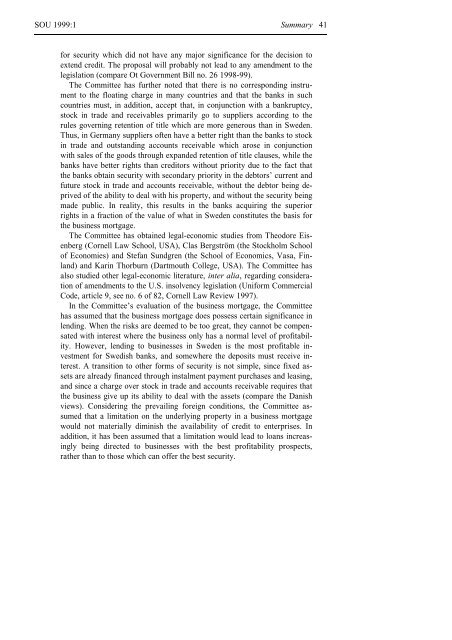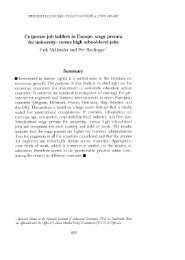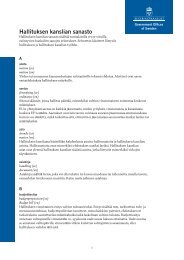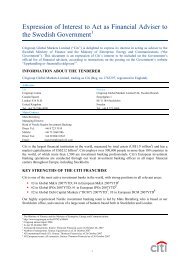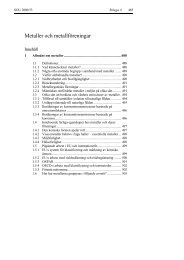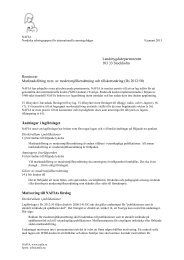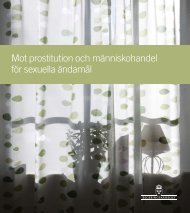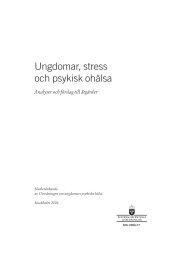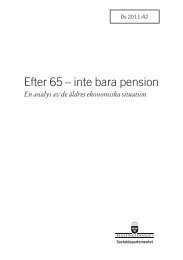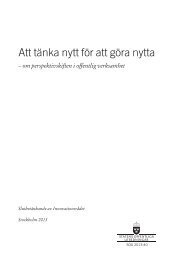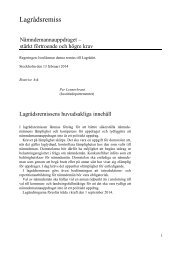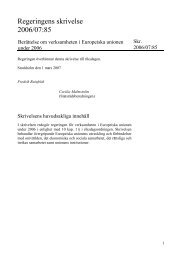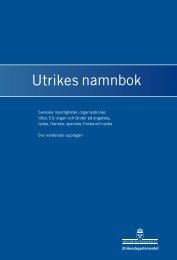- Page 1 and 2: Till statsrådet och chefen för Ju
- Page 3 and 4: SOU 1999:1 Innehåll 5 Innehåll I
- Page 5 and 6: SOU 1999:1 Innehåll 7 5.3 Tidigare
- Page 7 and 8: SOU 1999:1 Innehåll 9 9.1.4 Konsek
- Page 9 and 10: SOU 1999:1 Förkortningar 11 Förko
- Page 11 and 12: SOU 1999:1 Sammanfattning 13 Samman
- Page 13 and 14: SOU 1999:1 Sammanfattning 15 betalt
- Page 15 and 16: SOU 1999:1 Sammanfattning 17 och ge
- Page 17 and 18: SOU 1999:1 Sammanfattning 19 konkur
- Page 19 and 20: SOU 1999:1 Sammanfattning 21 Däref
- Page 21 and 22: SOU 1999:1 Sammanfattning 23 ett se
- Page 23 and 24: SOU 1999:1 Sammanfattning 25 åtgä
- Page 25 and 26: SOU 1999:1 Sammanfattning 27 Andra
- Page 27 and 28: 30 Summary SOU 1999:1 Firstly, the
- Page 29 and 30: 32 Summary SOU 1999:1 the opposite
- Page 31 and 32: 34 Summary SOU 1999:1 ness as a res
- Page 33 and 34: 36 Summary SOU 1999:1 in bankruptci
- Page 35 and 36: 38 Summary SOU 1999:1 cases, he can
- Page 37: 40 Summary SOU 1999:1 actually are
- Page 41 and 42: 44 Summary SOU 1999:1 As a conseque
- Page 43 and 44: SOU 1999:1 Författningsförslag 47
- Page 45 and 46: SOU 1999:1 Författningsförslag 49
- Page 47 and 48: SOU 1999:1 Författningsförslag 51
- Page 49 and 50: SOU 1999:1 Författningsförslag 53
- Page 51 and 52: SOU 1999:1 Författningsförslag 55
- Page 53 and 54: SOU 1999:1 Författningsförslag 57
- Page 55 and 56: SOU 1999:1 Författningsförslag 59
- Page 57 and 58: SOU 1999:1 Författningsförslag 61
- Page 59 and 60: SOU 1999:1 Författningsförslag 63
- Page 61 and 62: SOU 1999:1 Författningsförslag 65
- Page 63 and 64: SOU 1999:1 Författningsförslag 67
- Page 65 and 66: SOU 1999:1 Författningsförslag 69
- Page 67 and 68: SOU 1999:1 Författningsförslag 71
- Page 69 and 70: SOU 1999:1 Författningsförslag 73
- Page 71 and 72: SOU 1999:1 Författningsförslag 75
- Page 73 and 74: SOU 1999:1 Författningsförslag 77
- Page 75 and 76: SOU 1999:1 Inledning 79 1 Inledning
- Page 77 and 78: SOU 1999:1 Inledning 81 Theodore Ei
- Page 79 and 80: 84 Förmånsrättsordningens ändam
- Page 81 and 82: 86 Förmånsrättsordningens ändam
- Page 83 and 84: 88 Förmånsrättsordningens ändam
- Page 85 and 86: 90 Förmånsrättsordningens ändam
- Page 87 and 88: 92 Förmånsrättsordningens ändam
- Page 89 and 90:
94 Utländsk rätt och internatione
- Page 91 and 92:
96 Utländsk rätt och internatione
- Page 93 and 94:
98 Utländsk rätt och internatione
- Page 95 and 96:
100 Utländsk rätt och internation
- Page 97 and 98:
102 Utländsk rätt och internation
- Page 99 and 100:
104 Utländsk rätt och internation
- Page 101 and 102:
106 Utländsk rätt och internation
- Page 103 and 104:
108 Utländsk rätt och internation
- Page 105 and 106:
110 Utländsk rätt och internation
- Page 107 and 108:
112 Utländsk rätt och internation
- Page 109 and 110:
114 Utländsk rätt och internation
- Page 111 and 112:
116 Utländsk rätt och internation
- Page 113 and 114:
118 Utländsk rätt och internation
- Page 115 and 116:
120 Utländsk rätt och internation
- Page 117 and 118:
SOU 1999:1 Statistik och ekonomiska
- Page 119 and 120:
SOU 1999:1 Statistik och ekonomiska
- Page 121 and 122:
SOU 1999:1 Statistik och ekonomiska
- Page 123 and 124:
SOU 1999:1 Statistik och ekonomiska
- Page 125 and 126:
SOU 1999:1 Statistik och ekonomiska
- Page 127 and 128:
SOU 1999:1 Statistik och ekonomiska
- Page 129 and 130:
SOU 1999:1 Statistik och ekonomiska
- Page 131 and 132:
SOU 1999:1 Statistik och ekonomiska
- Page 133 and 134:
SOU 1999:1 Statistik och ekonomiska
- Page 135 and 136:
SOU 1999:1 Statistik och ekonomiska
- Page 137 and 138:
SOU 1999:1 Statistik och ekonomiska
- Page 139 and 140:
SOU 1999:1 Statistik och ekonomiska
- Page 141 and 142:
SOU 1999:1 Statistik och ekonomiska
- Page 143 and 144:
SOU 1999:1 Statistik och ekonomiska
- Page 145 and 146:
SOU 1999:1 Statistik och ekonomiska
- Page 147 and 148:
SOU 1999:1 Statistik och ekonomiska
- Page 149 and 150:
SOU 1999:1 Statistik och ekonomiska
- Page 151 and 152:
SOU 1999:1 Statistik och ekonomiska
- Page 153 and 154:
SOU 1999:1 Statistik och ekonomiska
- Page 155 and 156:
162 Förmånsrätten för skatter o
- Page 157 and 158:
164 Förmånsrätten för skatter o
- Page 159 and 160:
166 Förmånsrätten för skatter o
- Page 161 and 162:
168 Förmånsrätten för skatter o
- Page 163 and 164:
170 Förmånsrätten för skatter o
- Page 165 and 166:
172 Förmånsrätten för skatter o
- Page 167 and 168:
174 Förmånsrätten för skatter o
- Page 169 and 170:
176 Förmånsrätten för skatter o
- Page 171 and 172:
178 Förmånsrätten för skatter o
- Page 173 and 174:
180 Förmånsrätten för skatter o
- Page 175 and 176:
182 Förmånsrätten för skatter o
- Page 177 and 178:
184 Förmånsrätten för skatter o
- Page 179 and 180:
186 Förmånsrätten för skatter o
- Page 181 and 182:
188 Förmånsrätten för skatter o
- Page 183 and 184:
190 Förmånsrätten för skatter o
- Page 185 and 186:
192 Förmånsrätten för skatter o
- Page 187 and 188:
194 Förmånsrätten för skatter o
- Page 189 and 190:
196 Förmånsrätten för skatter o
- Page 191 and 192:
SOU 1999:1 Löneprivilegiet och lö
- Page 193 and 194:
SOU 1999:1 Löneprivilegiet och lö
- Page 195 and 196:
SOU 1999:1 Löneprivilegiet och lö
- Page 197 and 198:
SOU 1999:1 Löneprivilegiet och lö
- Page 199 and 200:
SOU 1999:1 Löneprivilegiet och lö
- Page 201 and 202:
SOU 1999:1 Löneprivilegiet och lö
- Page 203 and 204:
SOU 1999:1 Löneprivilegiet och lö
- Page 205 and 206:
SOU 1999:1 Löneprivilegiet och lö
- Page 207 and 208:
SOU 1999:1 Löneprivilegiet och lö
- Page 209 and 210:
SOU 1999:1 Löneprivilegiet och lö
- Page 211 and 212:
SOU 1999:1 Löneprivilegiet och lö
- Page 213 and 214:
SOU 1999:1 Löneprivilegiet och lö
- Page 215 and 216:
SOU 1999:1 Löneprivilegiet och lö
- Page 217 and 218:
SOU 1999:1 Löneprivilegiet och lö
- Page 219 and 220:
SOU 1999:1 Löneprivilegiet och lö
- Page 221 and 222:
SOU 1999:1 Löneprivilegiet och lö
- Page 223 and 224:
SOU 1999:1 Löneprivilegiet och lö
- Page 225 and 226:
SOU 1999:1 Löneprivilegiet och lö
- Page 227 and 228:
SOU 1999:1 Löneprivilegiet och lö
- Page 229 and 230:
SOU 1999:1 Löneprivilegiet och lö
- Page 231 and 232:
SOU 1999:1 Löneprivilegiet och lö
- Page 233 and 234:
SOU 1999:1 Löneprivilegiet och lö
- Page 235 and 236:
SOU 1999:1 Löneprivilegiet och lö
- Page 237 and 238:
SOU 1999:1 Löneprivilegiet och lö
- Page 239 and 240:
SOU 1999:1 Löneprivilegiet och lö
- Page 241 and 242:
SOU 1999:1 Löneprivilegiet och lö
- Page 243 and 244:
252 Företagshypoteket SOU 1999:1 a
- Page 245 and 246:
254 Företagshypoteket SOU 1999:1 s
- Page 247 and 248:
256 Företagshypoteket SOU 1999:1 f
- Page 249 and 250:
258 Företagshypoteket SOU 1999:1 g
- Page 251 and 252:
260 Företagshypoteket SOU 1999:1 g
- Page 253 and 254:
262 Företagshypoteket SOU 1999:1 v
- Page 255 and 256:
264 Företagshypoteket SOU 1999:1 a
- Page 257 and 258:
266 Företagshypoteket SOU 1999:1 d
- Page 259 and 260:
268 Företagshypoteket SOU 1999:1 E
- Page 261 and 262:
270 Företagshypoteket SOU 1999:1 V
- Page 263 and 264:
272 Företagshypoteket SOU 1999:1 U
- Page 265 and 266:
274 Företagshypoteket SOU 1999:1 A
- Page 267 and 268:
276 Företagshypoteket SOU 1999:1 7
- Page 269 and 270:
278 Företagshypoteket SOU 1999:1 7
- Page 271 and 272:
280 Företagshypoteket SOU 1999:1 m
- Page 273 and 274:
282 Företagshypoteket SOU 1999:1 a
- Page 275 and 276:
284 Företagshypoteket SOU 1999:1 p
- Page 277 and 278:
286 Företagshypoteket SOU 1999:1 D
- Page 279 and 280:
288 Företagshypoteket SOU 1999:1 D
- Page 281 and 282:
290 Företagshypoteket SOU 1999:1 B
- Page 283 and 284:
292 Företagshypoteket SOU 1999:1 B
- Page 285 and 286:
294 Företagshypoteket SOU 1999:1 k
- Page 287 and 288:
296 Företagshypoteket SOU 1999:1 N
- Page 289 and 290:
298 Företagshypoteket SOU 1999:1 s
- Page 291 and 292:
300 Företagshypoteket SOU 1999:1 k
- Page 293 and 294:
302 Företagshypoteket SOU 1999:1 n
- Page 295 and 296:
304 Företagshypoteket SOU 1999:1 d
- Page 297 and 298:
306 Företagshypoteket SOU 1999:1 o
- Page 299 and 300:
308 Företagshypoteket SOU 1999:1 V
- Page 301 and 302:
310 Företagshypoteket SOU 1999:1 j
- Page 303 and 304:
312 Företagshypoteket SOU 1999:1 D
- Page 305 and 306:
314 Reformens genomförande SOU 199
- Page 307 and 308:
316 Reformens genomförande SOU 199
- Page 309 and 310:
SOU 1999:1 Övriga frågor 319 9 Ö
- Page 311 and 312:
SOU 1999:1 Övriga frågor 321 När
- Page 313 and 314:
SOU 1999:1 Övriga frågor 323 sidi
- Page 315 and 316:
326 Författningskommentar SOU 1999
- Page 317 and 318:
328 Författningskommentar SOU 1999
- Page 319 and 320:
330 Författningskommentar SOU 1999
- Page 321 and 322:
332 Författningskommentar SOU 1999
- Page 323 and 324:
334 Författningskommentar SOU 1999
- Page 325 and 326:
336 Författningskommentar SOU 1999
- Page 327 and 328:
338 Författningskommentar SOU 1999
- Page 329 and 330:
340 Författningskommentar SOU 1999
- Page 331 and 332:
342 Författningskommentar SOU 1999
- Page 333 and 334:
344 Författningskommentar SOU 1999
- Page 335 and 336:
346 Författningskommentar SOU 1999
- Page 337 and 338:
348 Författningskommentar SOU 1999
- Page 339 and 340:
350 Författningskommentar SOU 1999
- Page 341 and 342:
352 Författningskommentar SOU 1999
- Page 343 and 344:
354 Författningskommentar SOU 1999
- Page 345 and 346:
356 Författningskommentar SOU 1999
- Page 347 and 348:
358 Författningskommentar SOU 1999
- Page 349 and 350:
360 Författningskommentar SOU 1999
- Page 351 and 352:
362 Författningskommentar SOU 1999
- Page 353 and 354:
364 Författningskommentar SOU 1999
- Page 355 and 356:
366 Särskilda yttranden SOU 1999:1
- Page 357 and 358:
368 Särskilda yttranden SOU 1999:1
- Page 359 and 360:
370 Särskilda yttranden SOU 1999:1
- Page 361 and 362:
372 Särskilda yttranden SOU 1999:1
- Page 363 and 364:
374 Särskilda yttranden SOU 1999:1
- Page 365 and 366:
376 Särskilda yttranden SOU 1999:1
- Page 367 and 368:
378 Särskilda yttranden SOU 1999:1
- Page 369 and 370:
380 Särskilda yttranden SOU 1999:1
- Page 371 and 372:
382 Särskilda yttranden SOU 1999:1
- Page 373:
384 Särskilda yttranden SOU 1999:1


